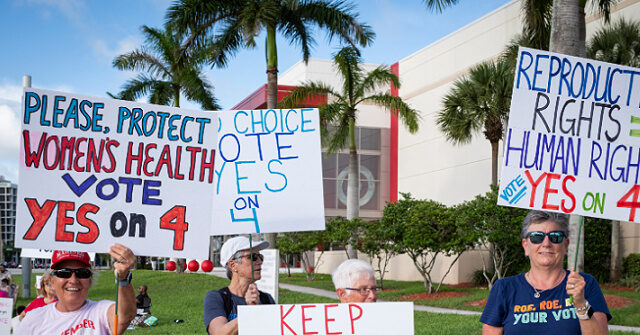Abortion rights are taking center stage in the upcoming Florida ballot, where voters will decide on Amendment 4, which aims to enshrine the right to abortion throughout pregnancy into the state constitution. Should this amendment pass, Florida could position itself as the primary abortion-accessible state in the southeastern United States, a region characterized by stringent restrictions on abortion. Neighboring states have instituted various limitations, such as Alabama and Arkansas with outright bans and North Carolina with restrictions at 12 weeks. With Amendment 4, Florida would permit abortions up to 24 weeks and beyond in cases where a patient’s health is at stake, potentially attracting women from states with more prohibitive laws seeking later-term abortions.
Currently, Florida enforces a six-week abortion limit, which went into effect on May 1, 2024, following legal battles surrounding earlier restrictions. Before this enforcement, Florida had a 15-week abortion limit, and state data reflected a significant increase in out-of-state women seeking abortions, indicating that the state had become an “abortion destination.” The evidence suggests a dramatic rise in abortions performed on out-of-state residents, with figures showing 7,736 such cases reported in 2022, rising from previous years. Such trends could revert if the six-week limit remains, as early reports indicate potential drops in total abortions following its enforcement, highlighting the ongoing fluctuations in demand and legality surrounding abortion services in the region.
The proposed Amendment 4 has garnered robust support from various advocacy groups, including Planned Parenthood and the ACLU of Florida, who argue for the necessity of reproductive rights. A successful vote on Amendment 4, requiring a minimum of 60% support, would not only dismantle the existing six-week constraint but also create a sustainable constitutional guarantee of rights to abortion in Florida, subject to the healthcare provider’s judgment. This would establish a legal framework where abortion could remain accessible under certain conditions throughout the duration of a pregnancy, which opponents argue could lead to the nullification of laws such as parental consent requirements.
Moreover, the Florida Agency for Health Care Administration (AHCA) has expressed strong opposition to the amendment, warning against its vague language which could potentially challenge at least 20 existing laws related to abortion. Governor Ron DeSantis has positioned himself firmly against the proposed legislation, suggesting that it is misleading and poses threats to women’s safety. Polling data on public support for the amendment presents a mixed picture, with many surveys showing fluctuating approval frequently aligning with the margins of error, indicating uncertainty among voters as the election date approaches.
The strategy of using ballot measures to advance abortion rights has proven effective in other states following the Supreme Court’s overruling of Roe v. Wade. Each pro-abortion ballot measure has succeeded thus far, often fueled by substantial financial contributions from well-funded organizations and individuals. Historical trends reveal a pattern of voters supporting measures that underscore or reaffirm abortion rights, even in contexts where such sentiments might not align with the majority opinions in surrounding states hostile to abortion. Notably, abortion-related measures in states like Michigan, California, and Vermont have all achieved constitutional affirmation, illustrating the potential for forward momentum in abortion advocacy.
As Florida prepares for this consequential vote, the implications of Amendment 4 extend beyond state lines, potentially reshaping reproductive rights in the southeastern United States. A successful outcome could firmly establish Florida as a leading source of reproductive healthcare access for women from surrounding states with more restrictive laws, creating a significant shift in regional healthcare dynamics. The landscape of abortion access and the legal frameworks governing it will likely evolve significantly in response to this electoral decision, reflecting broader national debates about reproductive rights that continue to unfold across the country.

